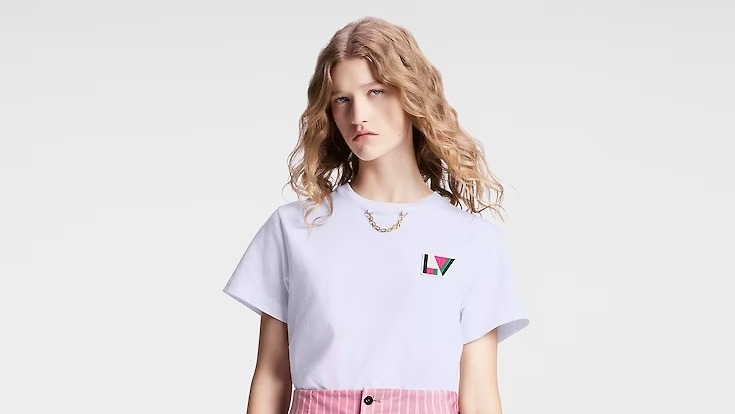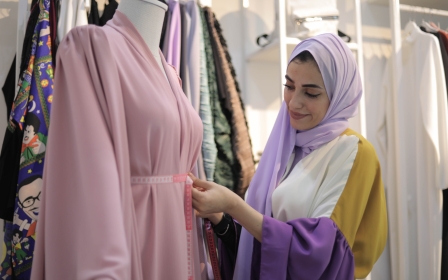Louis Vuitton embroiled in Gaza row over 'watermelon' T-shirt

French fashion house Louis Vuitton has found itself embroiled in an argument between supporters of Palestinians and backers of Israel over a $820 T-shirt.
Part of the spring-summer 2024 collection, the T-shirt is a simple white cotton jersey embellished with a patch featuring the LV initials in pink, green and black, which some users have likened to a watermelon slice.
The watermelon has long been used as a symbol of resistance by Palestinians and has witnessed an uptick in popularity in recent months by social media users who use the emoji to indicate their support for Palestine.
Several users accused the company, one of the world’s leading fashion brands, of capitalising on online pro-Palestinian sentiment for commercial gain.
“What this seems to me is Louis Vuitton, capitalising and profiteering off the mass movement in support of Palestinians,” wrote one user on X, formerly Twitter. “However, what they're not doing is supporting the Palestinian cause.”
New MEE newsletter: Jerusalem Dispatch
Sign up to get the latest insights and analysis on Israel-Palestine, alongside Turkey Unpacked and other MEE newsletters
“LV was on the boycott list due to their support,” said another user, referring to widespread calls to boycott the brand as the CEO of its parent company, LVMH, has invested heavily in Israeli companies including cybersecurity firm Wiz.
“Now it's playing a double game to make more profit.”
The watermelon, which shares the colours of the Palestinian flag, was popularised as a symbol of resistance following the 1967 Middle East war when Israel seized control of the West Bank, Gaza Strip and East Jerusalem. At the time, the Israeli government banned public displays of the Palestinian flag.
While the ban was lifted in 1993 as part of the Oslo Accords, the symbology remained.
More recently, people have resorted to using the watermelon emoji online to refer to Palestine or Palestinians as a way of avoiding being “shadow banned” on social media when posting about the Israeli war on Gaza, which has so far killed more than 32,000 Palestinians and wounded over 70,000.
‘Anti-Israel T-shirts’
While some people on social media have dismissed the notion of any hidden meanings, others have also accused the luxury giant of antisemitism and anti-Israel bias.
“Did @LouisVuitton create a $820 t shirt as an ode to Hamas?” asked the US-based Stop Antisemitism organisation on X. “Note the watermelon, colors, and upside down triangle.”
Hamas has used the red triangle to indicate Israeli targets in videos it has released of attacks its fighters have staged in Gaza.
“Lest we forget: LV company collaborated with the Vichy regime during WW2 & profited from their business dealings with N*zi Germany,” posted another user.
In an online report that has since been deleted, Israeli news channel i24 said that the controversy prompted LVMH CEO Sidney Toledano to clarify that the design was a coincidence and that steps are being taken to remove it from the website.
As of time of publication, the T-shirt was still online and it is unclear why the article was pulled by i24news.
Middle East Eye has asked LVMH for comment.
This is not the first time Louis Vuitton has faced backlash related to Palestinian symbols. In 2021, the fashion house came under fire for marketing a $700 scarf heavily influenced by the traditional Palestinian keffiyeh.
The monogrammed keffiyeh was criticised for appropriating Palestinian culture for financial gain while omitting the symbolism behind it in the product description.
This article is available in French on Middle East Eye French edition.
Middle East Eye delivers independent and unrivalled coverage and analysis of the Middle East, North Africa and beyond. To learn more about republishing this content and the associated fees, please fill out this form. More about MEE can be found here.




